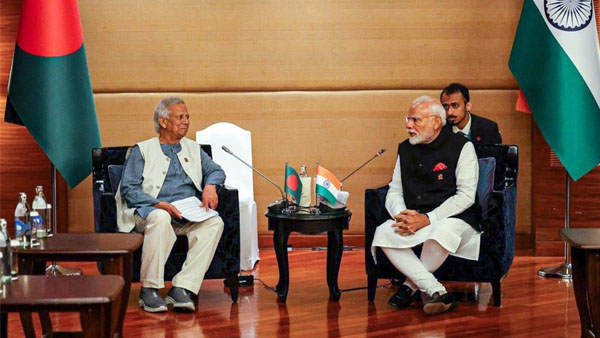By Dipak Kurmi
The recent trilateral dialogue held in Kunming, Yunnan province, involving China, Pakistan, and Bangladesh has reignited discussions about South Asia’s shifting geopolitical architecture. Framed as a meeting for regional cooperation, this engagement marks an important, though nuanced, moment in Bangladesh’s foreign policy trajectory. While Beijing and Islamabad projected the dialogue as a step towards deeper trilateral collaboration, Bangladesh responded with measured caution, signaling both a willingness to engage and a determination to preserve its strategic autonomy, especially in relation to India.
Convened last week, the Kunming meeting brought together high-ranking officials: Chinese Vice Foreign Minister Sun Weidong, Bangladesh’s Acting Foreign Secretary Ruhul Alam Siddique, and Pakistan’s Additional Foreign Secretary Imran Ahmed Siddiqui. The agenda included proposals to institutionalize the trilateral format through a Joint Working Group (JWG), which would have laid the groundwork for operationalizing a broader regional partnership across multiple sectors including trade, digital economy, maritime cooperation, education, and public health.
However, Dhaka stopped short of giving its full endorsement to the JWG, citing the need for further high-level internal consultations. This restrained response highlights Bangladesh’s delicate diplomatic balancing act. The country is keenly aware of the growing strategic rift between New Delhi and Beijing and is wary of aligning too closely with initiatives that could be interpreted as an affront to India, its most significant neighbor and long-time partner.
Bangladesh’s Foreign Affairs Adviser Md Touhid Hossain, on June 26, categorically clarified the government’s position. Addressing the media, he emphasized that the meeting was informal and non-political, and most importantly, not designed to form any new strategic alliance targeting any third country. “We are not forming any alliance. It was a meeting at the official level, not at the political level… There was no element of formation of any alliance,” Hossain remarked, directly addressing Indian concerns that the trilateral may be part of a broader Chinese strategy to encircle India.
Nevertheless, the context in which this meeting occurred is deeply significant. Dhaka’s diplomatic caution comes against the backdrop of increasingly strained India-Bangladesh relations following the recent political transition in Dhaka. The installation of the Yunus-led interim government has been accompanied by signals of a strategic recalibration in Bangladesh’s foreign policy. This evolving posture is evident not only in Dhaka’s engagement with Beijing and Islamabad but also in its renewed calls for reviving the South Asian Association for Regional Cooperation (SAARC)—a bloc India has deprioritized in favor of BIMSTEC, mainly due to Pakistan’s continued support for cross-border terrorism.
Chief Advisor Muhammad Yunus’ emphasis on SAARC, amid growing tension with New Delhi, hints at a deliberate foreign policy reorientation. India’s increasing disinterest in SAARC has led it to channel energy into BIMSTEC, which excludes Pakistan and focuses on the Bay of Bengal region. In contrast, Dhaka’s fresh push for SAARC’s revival reflects a strategic opening toward stakeholders less aligned with India. This divergence from the BIMSTEC-centric regionalism favored by New Delhi underscores the larger drift underway in Bangladesh’s geopolitical thinking.
Further complicating the scenario is the looming prospect of Lt Gen (retd) Abu Tayub Md Zahirul Alam’s appointment as Bangladesh’s Deputy National Security Adviser. Known for his links to Pakistan’s Inter-Services Intelligence (ISI) and his reputation for harboring anti-India sentiments, Zahirul Alam’s potential elevation is viewed as more than just a personnel choice. It symbolizes a strategic shift away from the secular, India-friendly legacy of the Awami League (AL) era towards a more assertively independent, and some argue, Pakistan-tilted security establishment.
Zahirul Alam’s record during his tenure as Commandant of Bangladesh’s National Defence College is emblematic of this tilt. He notably granted access to Pakistani military officers to the institution, a decision that raised alarms in New Delhi and among Bangladesh’s strategic community. His ideological orientation stands in stark contrast to that of Bangladesh Army Chief General Waker-Uz-Zaman, who continues to advocate for democratic elections, civilian oversight over the armed forces, and a neutral, apolitical military. The ideological rift between these two figures reflects the broader strategic tug-of-war currently playing out within Bangladesh’s power corridors.
Meanwhile, the Yunus-led interim government has intensified its domestic crackdown, raising further concerns about democratic backsliding and political instability. The ban on all activities of the Awami League—Bangladesh’s oldest and most prominent political party—under the Anti-Terrorism Act marks an unprecedented escalation. The UN High Commissioner for Human Rights has condemned this ban, labeling it a grave violation of fundamental democratic freedoms.
The political purge has also seen the arrest of Sabina Akter Tuhin, a former AL Member of Parliament, and the detention of independent MP Mohammad Faisal Biplob, both tied to the political unrest of the previous year. These arrests underscore the interim government’s determination to dismantle opposition voices and consolidate control. The deferment of elections and continued suppression of dissent have only deepened the crisis of legitimacy facing the current regime.
For India, the growing list of disquieting developments in Bangladesh—from the Kunming trilateral engagement and SAARC revival calls to the appointment of pro-Pakistan security officials and domestic political crackdowns—signals an urgent need to recalibrate its own diplomatic strategy. New Delhi cannot ignore the possibility that Dhaka may be inching closer towards Beijing’s strategic orbit, with Islamabad playing a facilitating role. While Bangladesh’s official statements emphasize non-alignment and diplomatic caution, the cumulative effect of these actions paints a more complex and potentially troubling picture for India’s regional security interests.
China’s strategic design in all this appears consistent with its larger goal of countering India’s influence in South Asia. By drawing Dhaka into trilateral dialogues and offering expansive cooperation frameworks that cut across economic, digital, maritime, and educational sectors, Beijing is steadily building diplomatic capital in Bangladesh. Pakistan’s role in this trilateral configuration is both symbolic and strategic—allowing China to present a unified South Asian front that subtly excludes India.
Yet, Dhaka’s measured response—especially its decision to withhold full approval for the Joint Working Group—suggests that Bangladesh remains keenly aware of the risks involved in an overt strategic shift. The country understands the geopolitical, economic, and security repercussions of alienating India, with whom it shares deep historical, economic, and cultural ties. India remains Bangladesh’s largest trading partner in the region and its most immediate neighbor. Any drastic realignment would carry both economic and strategic costs.
At this critical juncture, Bangladesh is attempting to walk a diplomatic tightrope—exploring new partnerships with China and Pakistan while keeping lines of communication with India open. However, given the growing convergence between Beijing and Islamabad, Dhaka’s moves warrant close observation. The next few months, especially decisions surrounding the formalization of the JWG, the appointment of key security figures, and the trajectory of the domestic political crackdown, will offer clearer signals about Bangladesh’s long-term strategic direction.
For India, the path forward must involve a recalibrated engagement strategy with Bangladesh—one that leverages historical goodwill but also addresses the emerging geopolitical realities. This includes stronger economic outreach, more robust people-to-people engagement, and recalibrated security cooperation to reassure Dhaka of India’s constructive intent.
While Bangladesh officially denies any new alliance with China and Pakistan, the unfolding developments suggest that New Delhi cannot afford complacency. Bangladesh’s evolving foreign policy, marked by cautious diplomacy but clear signs of recalibration, will remain a critical focal point for India’s strategic planners in the coming months.
(the writer can be reached at dipakkurmiglpltd@gmail.com)




